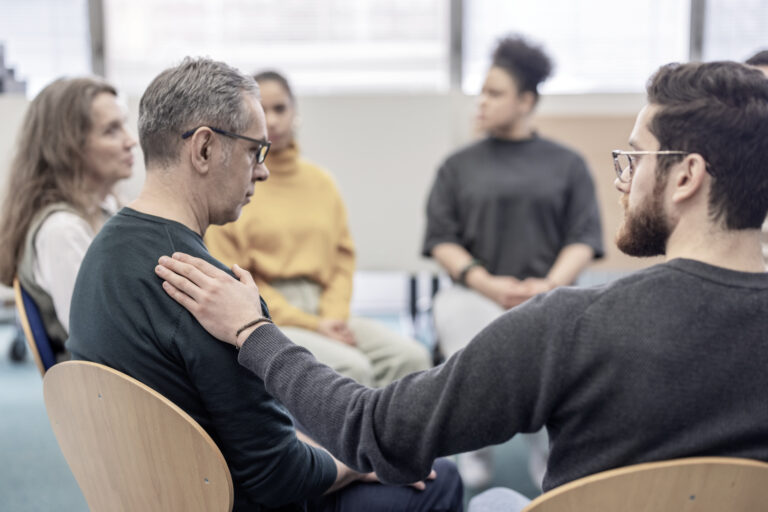Opioid addiction, or opioid use disorder (OUD), is a chronic condition marked by the compulsive use of opioids despite harmful physical, emotional, or social consequences. It often begins with prescribed medications such as oxycodone, hydrocodone, or morphine, but can progress to more dangerous substances like heroin or fentanyl.
At Pillars Health Group, we offer compassionate, evidence-based outpatient treatment programs specifically designed to help individuals break free from opioid addiction and build a lasting path to recovery.
Continue reading to explore how we treat opioid addiction, recognize the warning signs of misuse, and learn how to begin treatment at one of our New England rehab centers.

At Pillars Health Group, we recognize the complex and often underestimated nature of opioid addiction and provide comprehensive, evidence-based treatment programs tailored to each individual’s unique needs.
Our process begins with a thorough assessment to evaluate the person’s history of opioid use, any co-occurring mental health conditions, and their personal recovery goals. From there, we offer a full continuum of care, including:
Opioid detox is a critical first step in the recovery process, helping individuals safely manage withdrawal symptoms under medical supervision. It involves the gradual removal of opioids from the body while using medications and supportive care to reduce discomfort and cravings. Detox lays the foundation for long-term treatment by preparing individuals both physically and emotionally for the next phase of recovery.
Although we do not offer residential detox services for opioid addiction at our facilities, we work closely with trusted, accredited partners to arrange appropriate detox placement. After detox, clients can smoothly transition into one of our outpatient treatment programs for ongoing care and comprehensive recovery support.
Opioid withdrawal can be a physically and emotionally challenging experience. It’s often described as feeling like a severe case of the flu, combined with intense psychological distress. Common opioid withdrawal symptoms include muscle aches, nausea, vomiting, diarrhea, sweating, chills, anxiety, agitation, insomnia, and intense cravings.
These symptoms typically begin within six-to-12 hours of the last dose for short-acting opioids and may last up to a week or more, depending on the drug and duration of use.
Our Full-Day and Half-Day Outpatient Treatment Programs are thoughtfully designed to support individuals at every stage of their recovery from opioid addiction. For those requiring a more structured environment and daily therapeutic involvement, our Full-Day Outpatient Treatment Program provides intensive support five-to-six days per week.
For clients seeking a more flexible treatment option, our Half-Day Outpatient Treatment Program offers high-quality clinical care three-to-five days per week. It’s ideal for managing recovery alongside work, school, or family responsibilities. No matter the level of engagement, we work closely with each client to create a personalized treatment plan that fits their goals and lifestyle.
Both opioid recovery programs offer a comprehensive range of services, including evidence-based therapies, medication management, case management, and peer support to encourage long-term recovery.
Individual therapy sessions with our experienced clinicians are a cornerstone of the recovery journey from opioid addiction. These personalized, one-on-one sessions provide a supportive environment where clients can explore the root causes of their substance use, identify personal triggers, build healthier coping strategies, and work through any unresolved trauma or co-occurring mental health conditions.
We employ evidence-based therapeutic approaches such as cognitive-behavioral therapy (CBT), motivational interviewing (MI), and dialectical behavior therapy (DBT) to promote meaningful personal growth and long-term recovery.
Our group therapy sessions offer a collaborative, supportive space where individuals recovering from opioid addiction can share their experiences and connect with others navigating similar challenges.
Group therapy fosters open dialogue, mutual encouragement, and a sense of community that strengthens each person’s commitment to recovery. Core therapeutic models like cognitive-behavioral therapy (CBT) and dialectical behavior therapy (DBT) are integrated into group settings to promote emotional resilience and practical skill-building.
We can provide medication-assisted treatment (MAT) for intensive opioid addictions. MAT will consist of medications like methadone, buprenorphine, or naltrexone. All of which are used to reduce withdrawal symptoms, suppress cravings, and normalize brain chemistry.
And for individuals facing co-occurring mental health conditions alongside opioid addiction, medication management can play a vital role in supporting recovery—helping to stabilize mood, ease anxiety, and manage other related symptoms.
Our certified nurse practitioners oversee all aspects of medication management with expert care, ensuring each client receives safe, personalized, and effective pharmacological support tailored to their unique needs throughout the treatment process.
At an opioid treatment center like Pillars Health Group, case managers play a crucial role in supporting clients as they prepare for life beyond treatment. They help develop individualized aftercare plans and connect clients with local resources essential for sustained recovery, such as support groups, sober living arrangements, ongoing therapy, and wellness programs.
Our holistic approach to opioid addiction addresses more than just the physical dependence on opioids—it also prioritizes the emotional, mental, and social aspects of addiction. We empower clients to build healthy coping strategies, establish strong support systems, and create a meaningful, substance-free life.
Our Aftercare and Alumni Programs provide a supportive and adaptable bridge from structured treatment to everyday life. Designed for individuals recovering from opioid addiction, these programs offer a stable, encouraging environment where clients can continue developing their recovery skills and maintain progress while reengaging with daily responsibilities.
Tailored for those transitioning into greater independence, these services ensure continued connection, guidance, and motivation. Even after completing intensive care, our clients remain part of a compassionate community committed to lasting recovery and ongoing personal growth.

Opioid addiction often begins with the legitimate use of prescription painkillers, but due to the drugs’ powerful effects on the brain’s reward system, dependence can develop quickly. Identifying the early signs and symptoms of opioid addiction is essential to seeking timely help—before the physical, emotional, and behavioral consequences become more severe and harder to reverse.
Common physical signs and symptoms of opioid addiction include:
Common behavioral and psychological signs of opioid addiction include:
As opioid use becomes more frequent or long-term, these symptoms can escalate into serious health complications, strained relationships, and increased risk of overdose. Early intervention and comprehensive treatment are critical in breaking the cycle of addiction and supporting lasting recovery.
If you’re a New England resident searching for “outpatient opioid treatment near me,” then we’re here to help. We provide opioid addiction treatment at all of our outpatient rehab centers in Massachusetts and Maine:
Whether you’re just beginning to seek help or are ready to begin structured outpatient care, our compassionate team is here to support you every step of the way. From coordinating with trusted detox partners (if needed) to developing a personalized treatment plan, we are committed to guiding you toward lasting recovery and improved quality of life.
We also help individuals navigate insurance coverage for opioid addiction treatment. Get a free health insurance benefits check—no pressure or obligation—so you can clearly understand your options without added stress.
Contact us to speak with a care coordinator, learn more about our outpatient programs, and take the first step toward a healthier future by enrolling in an opioid addiction treatment program today. You can call us at (855) 828-0575, email info@pillarshg.com, or fill out the form below.
Dedicated to mental health treatment and addiction recovery with compassionate, personalized care.